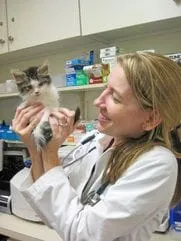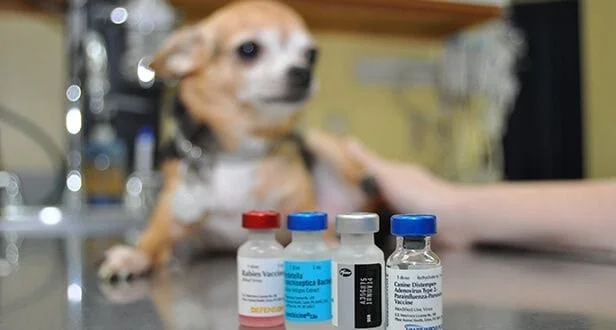
The veterinarians and staff of Greater South River Animal Hospital truly understand how important your pet is to your family, because they are just as important to us. We strongly believe in building close a relationship with not only your pet, but with your family because together is the only way that we can effectively keep your pets living a healthy and happy life.
As pet owners ourselves, we only recommend what we would do for our own pets. This includes routine wellness check-ups, proper dental care here and at home, appropriate vaccinations, and regular wellness screenings for common diseases that could shorten your pet's life span.
Wellness Examinations
During your pet's wellness examination your veterinarian will:
- Listen to your pet's heart and lungs - At that time the veterinarian may catch early signs of cardiac disease, infections, or obstructive diseases.
- Check your pet's teeth and oral cavity- This is an important step towards preventing dental disease and to ensure that puppies and kittens are losing all of their baby teeth.
- Evaluate your pet's vision- During this time your veterinarian can catch early signs of blindness, cataracts, lens stiffness, scratches or ocular infections.
- Examine your pet's ears - Ear disease is common amongst many types of pets. With an ear cytology, we can determine if there is a bacterial infection in your pet's ears and administer the appropriate medication to resolve the problem. Untreated ear disease can lead to uncontrollable head shaking which sometimes leads to ear hematomas (When blood vessels rupture inside the ear flap and cause it to fill with blood and fluid)
- Palpate the lymph nodes, abdomen and skin- We are looking for unusual lumps, swellings, lesions, skin discoloration, hair loss, fleas and ticks, abscesses, stiff abdomen and lacerations.
- Palpate joints and muscles - We observe your pet's gait for developmental issues, swollen joints, decreased muscle tone, hip/elbow difficulties, or early signs of arthritis.
- Lab Work - Our recommended tests include a heartworm test, fecal flotation test for intestinal parasites, a complete blood cell count, urinalysis and a blood chemistry profile in order to create a baseline of systematic health.
Protect your pet with Vaccinations
Our vaccinations are not only safe and effective; they are a fundamental piece of your pet's preventative health care plan. Thanks to new advances in veterinary immunology, diseases that were once relatively common and fatal are now easily preventable. We treat the patient as an individual, which is why we try not to generalize what vaccinations all dogs or cats should have.
The vaccinations recommended for our area are rabies (every 3 years), distemper-parvo and lyme vaccines (every year). Bordetella and Canine Influenza may be suggested if a patient interacts with other pets. The same applies to outdoor cats that may require a leukemia vaccine. The key to reducing the number and amount of vaccines is through a process known as vaccine titering. Essentially, this involves testing a small amount of blood for the presence of antibodies to specific diseases. If the levels are satisfactory to prevent disease, then your pet should not require an additional vaccine.
Geriatric Veterinary Care
Cats and dogs in their senior years may have slowed down a bit, but they are still very loving and satisfying companions to have. They also require a bit more veterinary care in order to keep them living a comfortable and happy life for many more years. We recommend regular wellness examinations every 6 months past the age of 6. We also suggest comprehensive testing and sometimes radiological surveys designed to help us catch any problems associates with aging before they become too difficult to manage or too expensive to treat.
Home Again Microchips
We hope you never have to go through the scary experience of losing a pet. Unfortunately it happens more often than people think and many of those lost pets never return home. Home Again Microchips are designed to last your pet's entire lifetime and they are linked to an online database that contains all of your information should your pet become lost.
When people find a lost pet they automatically think to go to animal hospitals or shelters to get them scanned for any microchips. Many times owners will implant a microchip, but never register their information with the Home Again Company. At Greater South River Animal Hospital we not only safely implant the microchip, but we also take the steps necessary to register your pet to your contact information.


